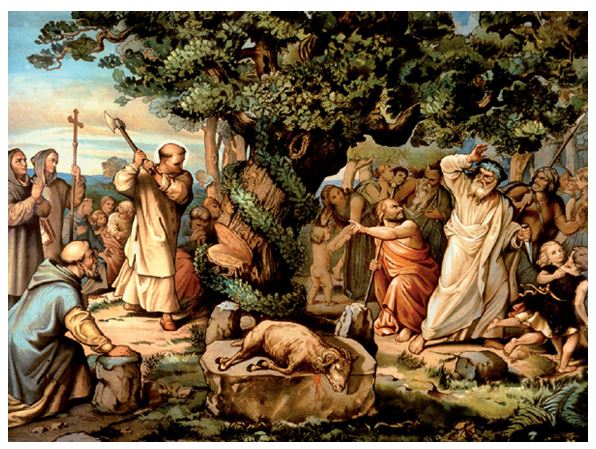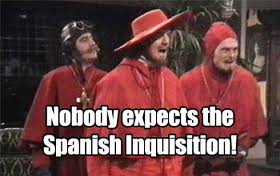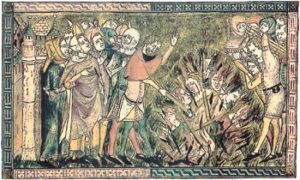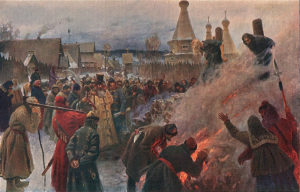This is the second part of 12 Reasons why I follow the Heathen Gods and not the Christian One. If you want to read the first part, you can read it HERE.
In the last piece, I slammed the Christian faith, but I realized I didn’t really address Heathen beliefs. So, even though this includes comments about how Christianity differs, my main focus is on Heathenry.
So, let’s get started and see why I prefer Heathenry over Christianity.
8. Heathenry doesn’t care whom you worship or who worships our Heathen gods
In most forms, Heathenry really doesn’t care if you worship our gods, the Christian god, some other pantheon, or no god. In the past Heathens would worship gods from different cultures alongside the Norse/Germanic gods. Granted, it seems a little incongruous to worship the white Christ alongside Thor, but there you go. I personally think it’s folly to worship the Christian god alongside our gods, because the Christian god has made it abundantly clear he does not want to be worshiped alongside pagan gods.
But, if I want to honor Tyr, Skadi, Perun, Zisa, and some other god, that’s no big deal to Heathenry, for the most part. (Yeah, there are wankers in every religion, including ours, who will say that’s not Heathenry, but they’re not Asa-popes, so ignore them.) The main part of Heathenry is that you accept our Nordic gods and goddesses, and that’s about it.
Our Gods are Colorblind
 Also, our gods and goddesses are colorblind. That means that it doesn’t matter what ethnicity you come from, if you’re Heathen, you’re with us. Yeah there are some folkish (AKA racist) types who have decided for whatever bizarre reason that only white, Northern peoples can worship our gods, but that’s totally incorrect, especially given the recent DNA and bone mineral compositions discovered in archaeology. People who have occupied Viking burials have proven to originate in Poland, Russia, Slavic countries, Mediterreanan countries (including Italy and Spain), Mongolia, and North Africa.
Also, our gods and goddesses are colorblind. That means that it doesn’t matter what ethnicity you come from, if you’re Heathen, you’re with us. Yeah there are some folkish (AKA racist) types who have decided for whatever bizarre reason that only white, Northern peoples can worship our gods, but that’s totally incorrect, especially given the recent DNA and bone mineral compositions discovered in archaeology. People who have occupied Viking burials have proven to originate in Poland, Russia, Slavic countries, Mediterreanan countries (including Italy and Spain), Mongolia, and North Africa.
 Warning: SCIENCE! or How We Know Where People Came From
Warning: SCIENCE! or How We Know Where People Came From
We know Vikings came from different ethnicities because scientists analyzed the strontium isotopes in their teeth and compared it with the soil of many places. The land you grew up in leaves a lasting strontium signature that is unique to that land. Scientists can determine where the person in a particular gravesite grew up given the unique set to isotopes. So, even though we only have some writings about a black Viking, we can infer from the strontium isotopes that those who were given warriors’ burials (or, at least burials with grave goods) were not just from Scandinavia (although many were), many were from other regions and other skin colors. Many had Mjolnir pendants. Surprise!
Vikings Went EVERYWHERE
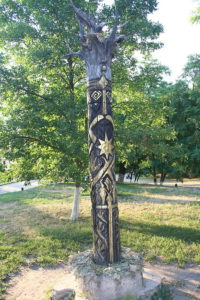 This should come to no surprise to anyone because the Vikings traveled as far east as Baghdad, as south as North Africa, and as west as the Eastern seaboard of North America. We know from new finds in archaeology that there was a thriving eastern trade between the Vikings and places such as Constantinople, Baghdad, and a number of cities around the Caspian Sea. Vikings left runes, carvings of their ships, and other artifacts where they went. It makes sense that they mingled with the local populace, and even obtained mates from those locations.
This should come to no surprise to anyone because the Vikings traveled as far east as Baghdad, as south as North Africa, and as west as the Eastern seaboard of North America. We know from new finds in archaeology that there was a thriving eastern trade between the Vikings and places such as Constantinople, Baghdad, and a number of cities around the Caspian Sea. Vikings left runes, carvings of their ships, and other artifacts where they went. It makes sense that they mingled with the local populace, and even obtained mates from those locations.
Heathenry is Egalitarian
So, it makes sense that Heathenry should be egalitarian, in respect to other faiths. Heathens incorporated the gods of others with their own gods, and worshiped whatever gods made sense to them.
Christianity, however, is a religion of persecutors. I have plenty of documented evidence how pagans were constantly forced to convert — often at sword point. The so-called Christian persecution by Romans doesn’t really hold up when comparing the biblical texts to Roman historians. Did persecution occur? I don’t doubt some did, but I more suspect those stories were made up to provide martyrs for the church.
7. Heathenism treats men and women more as equals; Christianity is misogynistic
Heathenry treats our men and women as equals now, and in the past, they were treated almost as equals. We know that the concept of the shieldmaiden isn’t a fanciful story, given that we’re now discovering burials with swords and weapons of war include women, whose skeletons were mistaken as men’s until someone thought to run DNA analysis on them.
Misogyny as a Christian Tradition
 Unfortunately, most of our modern beliefs and misogyny stems from our Christian traditions. That women could never be warriors, that they didn’t have a role in society, other than producing babies, and that they didn’t travel with the Viking men. And yet, we’re now finding more and more graves that had presumably Viking men contain female skeletons with swords.
Unfortunately, most of our modern beliefs and misogyny stems from our Christian traditions. That women could never be warriors, that they didn’t have a role in society, other than producing babies, and that they didn’t travel with the Viking men. And yet, we’re now finding more and more graves that had presumably Viking men contain female skeletons with swords.
Now, some people discount this, saying that they didn’t think the women actually used the swords, but as one archaeologist so deftly put it, “Would there even be an argument that the person buried with the sword was a warrior, if that person was male?” Excellent point.
Women were often priestesses called Gydhja. Heathens revered these women and they helped people when it came to healing, seeing the future, and talking to the gods. Yes, there were priests (Godhi), but women played a significant role as well.
Although nowadays some sects of Christianity allow women priests, this is something that has occurred within the past fifty years. Even so, many sects–including the Catholic Church–do not allow priestesses. Obviously a travesty and it aligns with what is in their bible.
Women Fought and Traded Alongside Viking Men
 Preconceived notions aside, we know from burials that women did accompany men given the strontium isotopes in their teeth. And while more Viking men than women came from Scandinavia, there was a large enough faction in both sexes which came from other places. In other words, there was more diversity in women than men, but at the same time, there were enough men who came from different places who were given Viking-style graves to suggest that the women weren’t slaves or concubines, necessarily. The grave goods in the burials suggest that they were people of some status other than slaves.
Preconceived notions aside, we know from burials that women did accompany men given the strontium isotopes in their teeth. And while more Viking men than women came from Scandinavia, there was a large enough faction in both sexes which came from other places. In other words, there was more diversity in women than men, but at the same time, there were enough men who came from different places who were given Viking-style graves to suggest that the women weren’t slaves or concubines, necessarily. The grave goods in the burials suggest that they were people of some status other than slaves.
Not all women who came with the Vikings were warriors, though. Most likely many of them were traders, artisans, skilled crafters of goods, and other support laborers. Sure, there were the camp followers, but there was also a need for someone to support the armies or raiding parties, as well as establish connections with the locals in the area. Both men and women could easily fill that role.
Women in Viking Society Had More Rights
We know that a woman could divorce a man under certain circumstances. We also know that women could own land, titles, and a fair amount of property, especially if they were widowed. Women were priestesses, and seidr was considered more of feminine magic than male magic. Freyja was a major deity, right alongside Odin and Thor. We know that Freyja gets first pick of the dead warriors — which presumably includes female warriors. Yeah, Odin gets the second cut. Think about that.
I’m not claiming that everything was fair for women. In fact we see in our myths that Odin was and could be downright misogynous. Just read the passages from the Havamal about his belief concerning women, and I rest my case.
Christianity is Misogynous
Okay, so let’s look at what Christianity says about women. Paul says women should obey their husbands in Corinthians. Timothy has a slew of bullshit. Outside of the Bible, you have people like Martin Luther saying “If a woman grows weary and at last dies from childbearing, it matters not. Let her die from bearing, she is there to do it.” Wow. What an asshole.
Women have almost always been the victims of witch hunts since Christianity began. The “Thou shall not suffer a witch to live” in the Bible (Exodus 22:18) has given religious leaders a reason to murder innocent women throughout the ages. And while men did get caught up in this bullshit, more often women are the targets.
6. Most Heathens accepts Science as fact; Christians, not so much
Most Heathens accept science and the information it has brought to us on how our world was formed, Sure, we have our own version of fundamentalism, but if pressed, I think most Heathens would accept the latest archaeological findings.
Norse Creation Stories
 Our religion has its own creation stories. We certainly don’t accept that the world was created in six days like the Christians. Most of us also don’t believe that our world came into being when fire and ice joined together and made rime that a cow licked to create Frost Giants and gods. And most of us don’t believe that Odin and his brothers killed Ymir to create our world. If hard pressed, I’d say that Heathens consider the Norse creation story as a myth and not fact. I believe the story is an allegory of sorts, explaining to a Bronze Age to Iron Age culture how the world came into existence. It gives a satisfactory tale that people enjoy listening to.
Our religion has its own creation stories. We certainly don’t accept that the world was created in six days like the Christians. Most of us also don’t believe that our world came into being when fire and ice joined together and made rime that a cow licked to create Frost Giants and gods. And most of us don’t believe that Odin and his brothers killed Ymir to create our world. If hard pressed, I’d say that Heathens consider the Norse creation story as a myth and not fact. I believe the story is an allegory of sorts, explaining to a Bronze Age to Iron Age culture how the world came into existence. It gives a satisfactory tale that people enjoy listening to.
Viking Creation Stories Are Oral Traditions, Similar to the Children’s Game of Telephone
Viking stories were oral traditions. That means they weren’t written down. Sure, we have images of certain stories that show that the key components were still told, but oral traditions change after time. Since the creation story was written down well after the Viking Age, chances are it changed quite a bit over the years. Chances are the story people told before the Viking Age began and what they told after Scandinavia was Christianized were probably very different, as our Northern ancestors told and retold the stories countless times, embellishing them for the audience, similar to the children’s game of telephone. (Or is it called “operator?” I can’t remember.)
My point is Heathens generally don’t consider these stories as gospel. They are stories about our gods and heroes that have elements of truth in them, but aren’t considered a science text. Even so, we have sagas that have led us to discoveries such as the Viking settlement in North America and other interesting archaeological finds.
5. Heathens consider our writings incomplete and written by humans; Christians believe that their Bible is the word of their god
 Bronze age to Iron age peoples wrote the Bible, not their god. There are so many inconsistencies within the Bible that you really can’t expect to take the text as law. Heathens, on the other hand, know that our stories were passed down in an oral tradition until someone like Snorri Sturluson wrote them down. We know they’re not complete, and we know that they’ve been influenced by Christianity.
Bronze age to Iron age peoples wrote the Bible, not their god. There are so many inconsistencies within the Bible that you really can’t expect to take the text as law. Heathens, on the other hand, know that our stories were passed down in an oral tradition until someone like Snorri Sturluson wrote them down. We know they’re not complete, and we know that they’ve been influenced by Christianity.
We also know that there are common themes in the Norse stories we read. For example, we know that Tyr sacrificed his hand to Fenrir because we see images of Fenrir and Tyr on artifacts.
What about the Havamal?
 Some believe the Havamal is Odin’s own writings. I can’t say for certain, but there might be a glimmer of truth to that. Still, if you believe the Havamal is Odin’s own words, that’s okay. He provides guidelines and not laws like the Christian god for how to live your life. It’s simply words of wisdom coming from the All Father.
Some believe the Havamal is Odin’s own writings. I can’t say for certain, but there might be a glimmer of truth to that. Still, if you believe the Havamal is Odin’s own words, that’s okay. He provides guidelines and not laws like the Christian god for how to live your life. It’s simply words of wisdom coming from the All Father.
The Havamal does have misogynistic statements in it. But you do have to consider the source–if indeed Odin wrote it. I don’t consider Odin a role model for how to treat women, and you shouldn’t either. So, like anything, Heathens take the story with a grain of salt. Or they should.
 Heathens Accept Unverified Personal Gnosis or UPG (More on this later)
Heathens Accept Unverified Personal Gnosis or UPG (More on this later)
As Heathens we accept that the Heathen gods are still around and speak to us personally. We don’t require a church to hear our gods.
Okay, I’ve espoused enough for this time why Heathenry is infinitely better than Christianity. I’ll hopefully have a wrap up sometime soon. Again, take what you like out of this and tell me what you think in the comments section.
—
Disclaimer: This post contains affiliate links. If you purchase something from these links, I get a small stipend which helps support The Rational Heathen. I would encourage you to support my site. Thanks.
Did you know you can become my patron for as little as $5 a month? This entitles you to content not posted anywhere else. Plus you get to see posts like this three days before the public! Without patrons, I’d be having a very hard time keeping this blog going. Become a patron today! Become a Patron!
 No sooner had I excoriated Greg Locke and his group of followers in my last post, then he starts with actual witch hunts. He claims that there are six people who are witches sent to infiltrate his church–two of them in his wife’s bible study group! And–you ain’t goina believe this shit–he discovers this from talking with demons.
No sooner had I excoriated Greg Locke and his group of followers in my last post, then he starts with actual witch hunts. He claims that there are six people who are witches sent to infiltrate his church–two of them in his wife’s bible study group! And–you ain’t goina believe this shit–he discovers this from talking with demons. Looking at the topic, I can see that if I covered the history of witch hunts, that would end up being a post unto itself. (Which I may just do for GP.) Suffice to say, you’ve probably heard of at least the Salem Witch Trials, the Spanish Inquisition, and yes, the whole witch burning thing. Witch hunts still exist primarily in third world countries such as India, Kenya, Ghana, and Tennessee*.
Looking at the topic, I can see that if I covered the history of witch hunts, that would end up being a post unto itself. (Which I may just do for GP.) Suffice to say, you’ve probably heard of at least the Salem Witch Trials, the Spanish Inquisition, and yes, the whole witch burning thing. Witch hunts still exist primarily in third world countries such as India, Kenya, Ghana, and Tennessee*. Let’s first consider this preacher’s accusations. Would a true witch really try to infiltrate a church group such as Global Vision Bible Church? (Greg Locke’s church?) This is the same church that insists people going maskless, not getting vaccinated, and held a book burning. I think that most pagans (including witches) would avoid their church just to avoid that cesspool of Covid-19 carriers. If anything, witches would probably just hex them from afar and be done with it–not sully their brains with such pedantic chatter.
Let’s first consider this preacher’s accusations. Would a true witch really try to infiltrate a church group such as Global Vision Bible Church? (Greg Locke’s church?) This is the same church that insists people going maskless, not getting vaccinated, and held a book burning. I think that most pagans (including witches) would avoid their church just to avoid that cesspool of Covid-19 carriers. If anything, witches would probably just hex them from afar and be done with it–not sully their brains with such pedantic chatter. Most likely, a person in their religious group is having an affair with another church member. And someone noticed another person having new-agey stuff like sage and crystals. Because they’re kind of cool. Sage is more a Native American cultural thing–not a demon thing. It certainly doesn’t have its roots in European witchcraft.
Most likely, a person in their religious group is having an affair with another church member. And someone noticed another person having new-agey stuff like sage and crystals. Because they’re kind of cool. Sage is more a Native American cultural thing–not a demon thing. It certainly doesn’t have its roots in European witchcraft. Interestingly enough, Locke claims he got the witches’ names–and one of their addresses–from demons. Uh, isn’t talking to demons something you’re not supposed to do as a Christian? Assuming he talked to them–maybe performing exorcisms or something–why the fuck would you talk with a demon? Demons can lie just like people, so how in the Hel does Locke know they said anything trustworthy? I mean, he’s taking a word of what Christians consider a fallen angel? What. The. Actual. Fuck?
Interestingly enough, Locke claims he got the witches’ names–and one of their addresses–from demons. Uh, isn’t talking to demons something you’re not supposed to do as a Christian? Assuming he talked to them–maybe performing exorcisms or something–why the fuck would you talk with a demon? Demons can lie just like people, so how in the Hel does Locke know they said anything trustworthy? I mean, he’s taking a word of what Christians consider a fallen angel? What. The. Actual. Fuck? If you consider witch hunts of the past, you’ll notice that it’s a way to gain power over the population. Witch hunts were often aimed at marginalized members of society, such as women, Jews, poor people, slaves, and those who simply couldn’t fight back. Occasionally, you’d see some prominent people such as the Templars be labeled witches, but in the Templars’ cases they had already fallen from grace because they had boatloads of money and the French king wanted to get his grubby hands on it.
If you consider witch hunts of the past, you’ll notice that it’s a way to gain power over the population. Witch hunts were often aimed at marginalized members of society, such as women, Jews, poor people, slaves, and those who simply couldn’t fight back. Occasionally, you’d see some prominent people such as the Templars be labeled witches, but in the Templars’ cases they had already fallen from grace because they had boatloads of money and the French king wanted to get his grubby hands on it.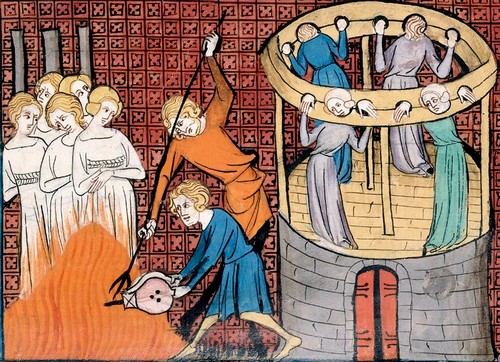

 The lack of basic logic in people today confounds me. I used to think that human beings were generally intelligent, but now, I’m pretty much convinced they’re not. At least the majority of people lack basic intelligence.
The lack of basic logic in people today confounds me. I used to think that human beings were generally intelligent, but now, I’m pretty much convinced they’re not. At least the majority of people lack basic intelligence. While not all progress is good, I’m seeing a lot of regression when it comes to the United States. People are clearly ignorant when it comes to science. A lot of folks believe what their neighbors and friends tell them rather than objectively look at the facts and make a rational decision.
While not all progress is good, I’m seeing a lot of regression when it comes to the United States. People are clearly ignorant when it comes to science. A lot of folks believe what their neighbors and friends tell them rather than objectively look at the facts and make a rational decision. If you’ve followed me for any length of time, you know I consider
If you’ve followed me for any length of time, you know I consider You see, many of their congregation do not believe in getting vaccinate against COVID-19, with predicable results. One woman whom I know was in tears (without a mask, by the way) because a prominent member of her congregation died from COVID-19. I would think this would cause everyone to line up to get vaccinated, or at least wear masks and social distance, but no. They continue their behavior and mistrust the vaccines because of anecdotal evidence.
You see, many of their congregation do not believe in getting vaccinate against COVID-19, with predicable results. One woman whom I know was in tears (without a mask, by the way) because a prominent member of her congregation died from COVID-19. I would think this would cause everyone to line up to get vaccinated, or at least wear masks and social distance, but no. They continue their behavior and mistrust the vaccines because of anecdotal evidence. Except me. And my husband. And if I could point out, my sisters, their spouses, and their children are vaccinated. At least a half dozen other people we know are vaccinate and have had no issues. In fact, I had some of the side effects (swollen, hot arm for a week, and feeling tired and achy for a few days), but I would still line up and get a booster if the experts said I needed to do it. Why? Because I know the disease is worse than the vaccination.
Except me. And my husband. And if I could point out, my sisters, their spouses, and their children are vaccinated. At least a half dozen other people we know are vaccinate and have had no issues. In fact, I had some of the side effects (swollen, hot arm for a week, and feeling tired and achy for a few days), but I would still line up and get a booster if the experts said I needed to do it. Why? Because I know the disease is worse than the vaccination. I doubt that my story will figure into the Holy Roller’s list of people she counts when talking about the COVID-19 vaccination, because it doesn’t fit her narrative. I listened to her statement about people getting sick from the vaccines and stay silent because she won’t listen to me. If she did, I would tell her correlation does not equal causation. In other words, just because something happened around the same time doesn’t mean the two events have anything to do with each other.
I doubt that my story will figure into the Holy Roller’s list of people she counts when talking about the COVID-19 vaccination, because it doesn’t fit her narrative. I listened to her statement about people getting sick from the vaccines and stay silent because she won’t listen to me. If she did, I would tell her correlation does not equal causation. In other words, just because something happened around the same time doesn’t mean the two events have anything to do with each other. I’m probably preaching to the choir, but the bullshit being spread via social media and talk shows shouldn’t be trusted. I don’t care how entertained, livid, or interested you are when you listen to these sources. I don’t care what quack guy with an MD after his name they got to testify about their latest miracle cure for COVID-19. The reality is if that so-called cure REALLY worked, the mainstream hospitals and doctors would be using it. Use logic, people!
I’m probably preaching to the choir, but the bullshit being spread via social media and talk shows shouldn’t be trusted. I don’t care how entertained, livid, or interested you are when you listen to these sources. I don’t care what quack guy with an MD after his name they got to testify about their latest miracle cure for COVID-19. The reality is if that so-called cure REALLY worked, the mainstream hospitals and doctors would be using it. Use logic, people! One of the basic tenets to being a Heathen is being a member of a community. I am all for rugged individualism and choices, but not in this case. When something causes you to harm others directly or indirectly, it is time to think about how your actions affect others. You can give COVID-19 to other non-vaccinated or even vaccinated people. You can be a host for a mutant strain that could cause more deaths. And you can become so sick that you and your like-minded pals fill up the hospitals to the point that they have no room or resources for other emergencies, like heart attacks or accident injuries. In other words, your irresponsibility has caused someone else to die, who could have been saved.
One of the basic tenets to being a Heathen is being a member of a community. I am all for rugged individualism and choices, but not in this case. When something causes you to harm others directly or indirectly, it is time to think about how your actions affect others. You can give COVID-19 to other non-vaccinated or even vaccinated people. You can be a host for a mutant strain that could cause more deaths. And you can become so sick that you and your like-minded pals fill up the hospitals to the point that they have no room or resources for other emergencies, like heart attacks or accident injuries. In other words, your irresponsibility has caused someone else to die, who could have been saved.
 Also, our gods and goddesses are colorblind. That means that it doesn’t matter what ethnicity you come from, if you’re Heathen, you’re with us. Yeah there are some folkish (AKA racist) types who have decided for whatever bizarre reason that only white, Northern peoples can worship our gods, but that’s totally incorrect, especially given the recent DNA and bone mineral compositions discovered in archaeology. People who have occupied Viking burials have proven to originate in Poland, Russia, Slavic countries, Mediterreanan countries (including Italy and Spain), Mongolia, and North Africa.
Also, our gods and goddesses are colorblind. That means that it doesn’t matter what ethnicity you come from, if you’re Heathen, you’re with us. Yeah there are some folkish (AKA racist) types who have decided for whatever bizarre reason that only white, Northern peoples can worship our gods, but that’s totally incorrect, especially given the recent DNA and bone mineral compositions discovered in archaeology. People who have occupied Viking burials have proven to originate in Poland, Russia, Slavic countries, Mediterreanan countries (including Italy and Spain), Mongolia, and North Africa. Warning: SCIENCE! or How We Know Where People Came From
Warning: SCIENCE! or How We Know Where People Came From This should come to no surprise to anyone because the Vikings traveled as far east as Baghdad, as south as North Africa, and as west as the Eastern seaboard of North America. We know from new finds in archaeology that there was a thriving eastern trade between the Vikings and places such as Constantinople, Baghdad, and a number of cities around the Caspian Sea. Vikings left runes, carvings of their ships, and other artifacts where they went. It makes sense that they mingled with the local populace, and even obtained mates from those locations.
This should come to no surprise to anyone because the Vikings traveled as far east as Baghdad, as south as North Africa, and as west as the Eastern seaboard of North America. We know from new finds in archaeology that there was a thriving eastern trade between the Vikings and places such as Constantinople, Baghdad, and a number of cities around the Caspian Sea. Vikings left runes, carvings of their ships, and other artifacts where they went. It makes sense that they mingled with the local populace, and even obtained mates from those locations.
 Preconceived notions aside, we know from burials that women did accompany men given the strontium isotopes in their teeth. And while more Viking men than women came from Scandinavia, there was a large enough faction in both sexes which came from other places. In other words, there was more diversity in women than men, but at the same time, there were enough men who came from different places who were given Viking-style graves to suggest that the women weren’t slaves or concubines, necessarily. The grave goods in the burials suggest that they were people of some status other than slaves.
Preconceived notions aside, we know from burials that women did accompany men given the strontium isotopes in their teeth. And while more Viking men than women came from Scandinavia, there was a large enough faction in both sexes which came from other places. In other words, there was more diversity in women than men, but at the same time, there were enough men who came from different places who were given Viking-style graves to suggest that the women weren’t slaves or concubines, necessarily. The grave goods in the burials suggest that they were people of some status other than slaves. Our religion has its own creation stories. We certainly don’t accept that the world was created in six days like the Christians. Most of us also don’t believe that our world came into being when fire and ice joined together and made rime that a cow licked to create Frost Giants and gods. And most of us don’t believe that Odin and his brothers killed Ymir to create our world. If hard pressed, I’d say that Heathens consider the Norse creation story as a myth and not fact. I believe the story is an allegory of sorts, explaining to a Bronze Age to Iron Age culture how the world came into existence. It gives a satisfactory tale that people enjoy listening to.
Our religion has its own creation stories. We certainly don’t accept that the world was created in six days like the Christians. Most of us also don’t believe that our world came into being when fire and ice joined together and made rime that a cow licked to create Frost Giants and gods. And most of us don’t believe that Odin and his brothers killed Ymir to create our world. If hard pressed, I’d say that Heathens consider the Norse creation story as a myth and not fact. I believe the story is an allegory of sorts, explaining to a Bronze Age to Iron Age culture how the world came into existence. It gives a satisfactory tale that people enjoy listening to.
 Heathens Accept Unverified Personal Gnosis or UPG (More on this later)
Heathens Accept Unverified Personal Gnosis or UPG (More on this later)
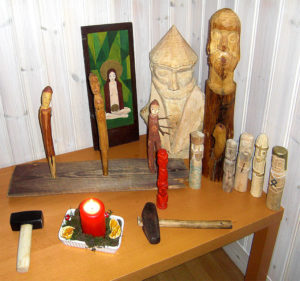 It’s been about six years since Tyr and Thor first entered my life as Norse gods and I’ve entered Heathenry. (Tyr has been in my life for years, only I didn’t recognize him.) I’ve been thankful they’ve done so because they’ve offered a a new perspective on my life that I had not gotten any other way. I still deal with a number of really stupid issues due to Christianity that I brought with me, but I can feel a certain amount of healing going on that I just didn’t have with the other religions, and lack of religion.
It’s been about six years since Tyr and Thor first entered my life as Norse gods and I’ve entered Heathenry. (Tyr has been in my life for years, only I didn’t recognize him.) I’ve been thankful they’ve done so because they’ve offered a a new perspective on my life that I had not gotten any other way. I still deal with a number of really stupid issues due to Christianity that I brought with me, but I can feel a certain amount of healing going on that I just didn’t have with the other religions, and lack of religion.
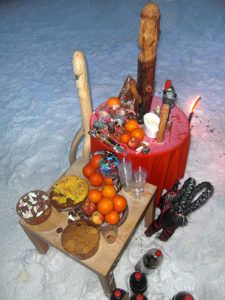 I’ll say it right up front that those who claim to “know” how Heathenry should be is full of shit. Sure, we have some good ideas how some of our ancestors practiced Heathenry, but overall,
I’ll say it right up front that those who claim to “know” how Heathenry should be is full of shit. Sure, we have some good ideas how some of our ancestors practiced Heathenry, but overall,  Even if we somehow magically figured out everything about Heathenry in the ancient times, would we really want to mimic it? If you say “yes” then apparently you want to bring back human sacrifice, and
Even if we somehow magically figured out everything about Heathenry in the ancient times, would we really want to mimic it? If you say “yes” then apparently you want to bring back human sacrifice, and 




